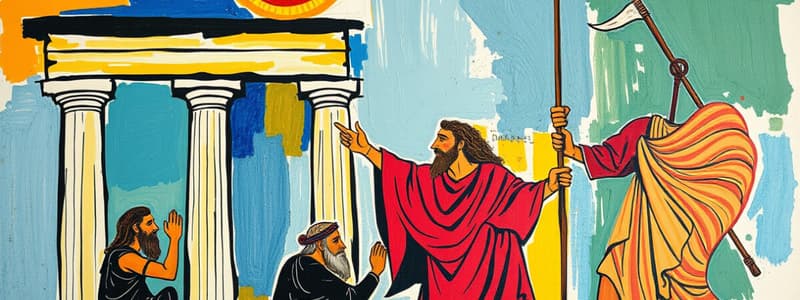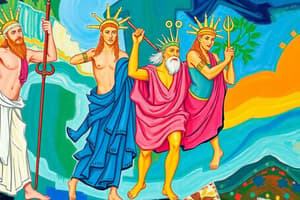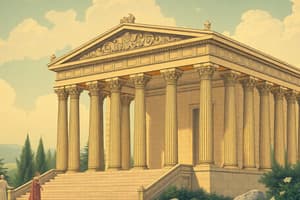Podcast
Questions and Answers
What is important to the well-being of the Greek state?
What is important to the well-being of the Greek state?
- Religion (correct)
- Architecture
- Art
- Education
The twelve chief gods and goddesses were thought to live on ______.
The twelve chief gods and goddesses were thought to live on ______.
Olympus
Who is the chief god of Greek religion?
Who is the chief god of Greek religion?
Zeus
Greek religion had a strong focus on morality.
Greek religion had a strong focus on morality.
What was the purpose of Greek religious rituals?
What was the purpose of Greek religious rituals?
What were the first athletic games held in honor of the gods?
What were the first athletic games held in honor of the gods?
The most famous oracle was the oracle of ______ at Delphi.
The most famous oracle was the oracle of ______ at Delphi.
What did the oracle of Delphi provide?
What did the oracle of Delphi provide?
Croesus was successful after consulting the oracle at Delphi.
Croesus was successful after consulting the oracle at Delphi.
Which statement is true about Greek drama and art?
Which statement is true about Greek drama and art?
What form was the most important in Greek architecture?
What form was the most important in Greek architecture?
The Parthenon is dedicated to the goddess ______.
The Parthenon is dedicated to the goddess ______.
In what century was the Parthenon built?
In what century was the Parthenon built?
Flashcards are hidden until you start studying
Study Notes
Greek Religion
- Integral part of Greek life, influencing state well-being.
- Major buildings in cities were temples for gods and goddesses.
Chief Deities
- Twelve main gods and goddesses lived on Mount Olympus.
- Notable figures include:
- Zeus: Chief god and father.
- Athena: Goddess of wisdom and crafts.
- Apollo: God of sun and poetry.
- Artemis: Goddess of moon and hunting, sister of Apollo.
- Ares: God of war.
- Aphrodite: Goddess of love.
- Poseidon: God of seas and earthquakes, brother of Zeus.
Nature of Greek Religion
- Lacked a formal doctrine and moral focus.
- Souls of most individuals went to a gloomy underworld ruled by Hades.
- Rituals involving prayers and offerings to gain favor from gods were essential, based on a reciprocal giving principle.
Festivals and Athletic Games
- Festivals honored deities, with special events across various locations, like Olympia for Zeus and Delphi for Apollo.
- Athletic competitions began with the Olympic Games in 776 B.C., showcasing the Greeks' athletic spirit in divine honor.
Oracles and Prophecies
- Oracles were sacred sites for divine revelations.
- Oracle of Apollo at Delphi was the most renowned, where a priestess conveyed prophecies interpreted by priests.
- Individuals and states sought guidance, often receiving ambiguous predictions.
Interpretation of Oracles
- Responses could be multifaceted, leading to unforeseen consequences.
- Example: Croesus misinterpreted an oracle regarding war with Persia, resulting in his empire's destruction.
Cultural Impact of Greek Religion
- While no longer practiced, Greek religion deeply influenced drama, art, and literature.
- Roman culture adopted Greek deities, influencing European and American narratives.
Classical Greek Arts and Literature
- Classical period's artistic standards shaped Western arts.
- Focused on ideal human beauty and expressed themes of reason, balance, and harmony to civilize emotions.
Greek Architecture and Sculpture
- Temples were the primary architectural form, dedicated to deities.
- Central temple rooms housed gods and safekept treasures, surrounded by columns for an open structure.
- Initial wooden columns transitioned to marble in the fifth century B.C.
Highlights of Greek Architecture
- Athens boasted exceptional classical architecture, particularly in the fifth century B.C.
- The Parthenon, built between 447 B.C. and 432 B.C., is the epitome of Classical Greek temples.
- Dedicated to Athena, it symbolizes Athenian pride and cultural values, integrating religious devotion and civic glory.
Studying That Suits You
Use AI to generate personalized quizzes and flashcards to suit your learning preferences.




